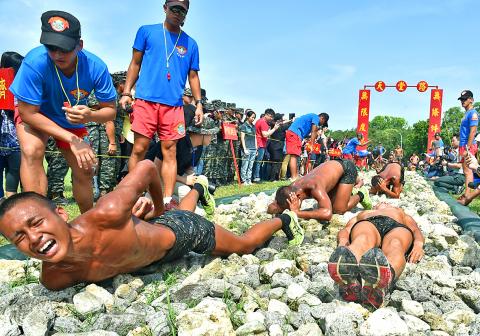Democratic Progressive Party Legislator Chen Ting-fei (陳亭妃) yesterday said that her words regarding the training regimen of Marine Corps recruits were taken out of context, adding that she intended to encourage more Taiwanese to join the military.
Chen raised the issue in a legislative committee meeting on Thursday by displaying photographs of a marine recruit with his nose bleeding while going through aquatic training at a naval base, along with other pictures of soldiers doing strenuous exercises.
She said that the images could discourage young people from signing up to the military and could cause anxiety among parents regarding the harsh treatment dished out by the military, adding that the photographs were released on Mother’s Day last weekend.

She said it was not the way to carry out military recruitment, adding that the photographs gave the impression that the marines had a more punishing training regimen than other branches, which could have a negative effect on the efforts to attract young people into the ranks of the all-volunteer force.
The photographs were taken during training of recruits for the Amphibious Reconnaissance and Patrol Unit, also known as the “frogmen” special forces branch of the Marine Corps, which is regarded as Taiwan’s equivalent to US Navy SEALs.
Deputy Ministry of National Defense Cheng De-mei (鄭德美) said that the photographs showed different training methods for recruits, adding that “the rigorous training is needed. If they do not receive proper training now and get a nosebleed, when they go into combat, they will have real bleeding.”
Chen’s words prompted criticism from some Internet users, who chided her for having no idea what military training is about and having no understanding of the tough conditions the recruits need to go through to become a member of the Amphibious Reconnaissance and Patrol Unit, and the kind of work they are expected to perform in the field.
Chen said her intention was to encourage recruits and military officials, adding that she wanted to help the Ministry of National Defense to use positive images and attributes to attract young people, rather than trying to scare them off.
“Some people have taken my words out of context and twisted their meaning at the committee meeting. Of course I know that some military units have to undergo harsh training. However, to attract new recruits to the all-volunteer force, there is no need to use photographs showing pain and bleeding from the ‘frogmen’ unit,” she said.
“I was trying to say that these photographs might create the misunderstanding that all new recruits have to undergo such rigorous training as the ‘frogmen’ unit. This might become a kind of negative promotion,” she added.
Chen said that she raised the issue to fight for better financial subsidies for the military, especially for elite forces requiring more rigorous physical training and burdened with heavier work duties than other branches, and to enable the nation to achieve the goal of an all-volunteer military force in the near future.

The manufacture of the remaining 28 M1A2T Abrams tanks Taiwan purchased from the US has recently been completed, and they are expected to be delivered within the next one to two months, a source said yesterday. The Ministry of National Defense is arranging cargo ships to transport the tanks to Taiwan as soon as possible, said the source, who is familiar with the matter. The estimated arrival time ranges from late this month to early next month, the source said. The 28 Abrams tanks make up the third and final batch of a total of 108 tanks, valued at about NT$40.5 billion

Two Taiwanese prosecutors were questioned by Chinese security personnel at their hotel during a trip to China’s Henan Province this month, the Mainland Affairs Council (MAC) said yesterday. The officers had personal information on the prosecutors, including “when they were assigned to their posts, their work locations and job titles,” MAC Deputy Minister and spokesman Liang Wen-chieh (梁文傑) said. On top of asking about their agencies and positions, the officers also questioned the prosecutors about the Cross-Strait Joint Crime-Fighting and Judicial Mutual Assistance Agreement, a pact that serves as the framework for Taiwan-China cooperation on combating crime and providing judicial assistance, Liang

A group from the Taiwanese Designers in Australia association yesterday represented Taiwan at the Midsumma Pride March in Melbourne. The march, held in the St. Kilda suburb, is the city’s largest LGBTQIA+ parade and the flagship event of the annual Midsumma Festival. It attracted more than 45,000 spectators who supported the 400 groups and 10,000 marchers that participated this year, the association said. Taiwanese Designers said they organized a team to march for Taiwan this year, joining politicians, government agencies, professionals and community organizations in showing support for LGBTQIA+ people and diverse communities. As the first country in Asia to legalize same-sex

MOTIVES QUESTIONED The PLA considers Xi’s policies toward Taiwan to be driven by personal considerations rather than military assessment, the Epoch Times reports Chinese President Xi Jinping’s (習近平) latest purge of the Chinese People’s Liberation Army (PLA) leadership might have been prompted by the military’s opposition to plans of invading Taiwan, the Epoch Times said. The Chinese military opposes waging war against Taiwan by a large consensus, putting it at odds with Xi’s vision, the Falun Gong-affiliated daily said in a report on Thursday, citing anonymous sources with insight into the PLA’s inner workings. The opposition is not the opinion of a few generals, but a widely shared view among the PLA cadre, the Epoch Times cited them as saying. “Chinese forces know full well that